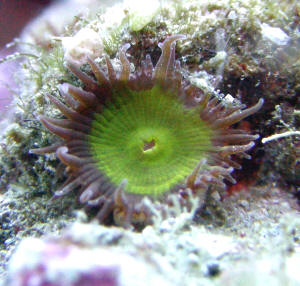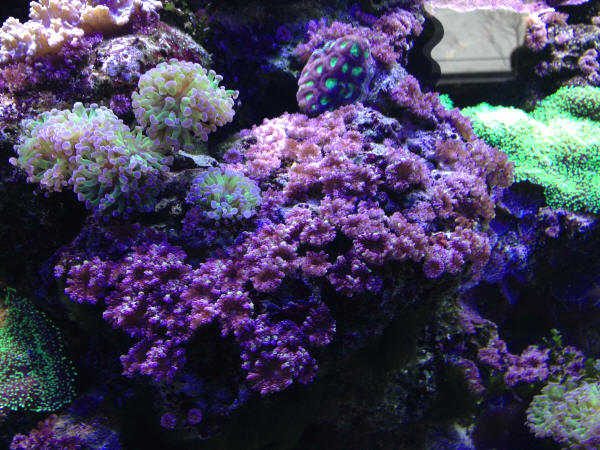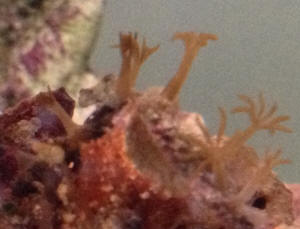|
FAQs on Identification of
Stinging-Celled Animals
30
Related Articles: Cnidarians,
Water Flow, How Much
is Enough,
Related FAQs: Cnidarian IDs 1, Cnidarian IDs 2, Cnidarian IDs 3, Cnidarians ID 4, Cnidarians ID 5, Cnidarians ID 6, Cnidarian ID 7, Cnidarian ID 8, Cnidarian ID 9, Cnidarian ID 10, Cnidarian ID 11, Cnidarian ID 12, Cnidarian ID 13, Cnidarian ID
14, Cnidarian ID
15, Cnidarian ID
16, Cnidarian ID 17, Cnidarian ID 18, Cnidarian ID 19, Cnidarian ID 20, Cnidarian ID 21, Cnidarian ID 22, Cnidarian ID 23, Cnidarian ID 24, Cnidarian ID 25, Cnidarian ID 26, Cnidarian ID 27,
Cnidarian ID 28,
Cnidarian
ID 29,
Cnidarian ID 31,
& Anemone ID 1, Aiptasia
ID 1, Stony Coral ID
1, Mushroom Identification,
Soft Coral ID, Alcyoniid ID, Xeniid ID, Cnidarians 1, Cnidarians 2, Cnidarian Behavior, Cnidarian Compatibility, Cnidarian Selection, Cnidarian Systems, Cnidarian Feeding, Cnidarian Disease, Cnidarian Reproduction,
Acclimating
Symbiotic Reef Invertebrates to Captive Lighting,
|

|
|
Hi, I'm just wondering if you could help me ID
3/20/13
these little pink anemones (I think) I noticed a few of them on my rock
about a year ago,
but now they are everywhere!!!
<Gorgeous! Do they lack skeletons then? I suspect they're
some sort of Zoanthid, but could be, as you state, a colonial Anemone
species... >
I have a 180 gallon tank with about 125 pounds of rock and these little
critters are definitely liking something about my tank...They are pink with
a touch of green and are almost fuzzy in appearance...1/4 to 1/2 inch
wide...and I have found out they sting pretty good!!! :o) They do add
a nice color but there are just too many of them...would like to find a way
to decrease their numbers. Thanks for your time!!! Steve
<Winners! Will take a bit of close look/seeing to distinguish twixt the
two... See WWM re defining characteristics of both groups. Bob Fenner>
|
 |
|
Polyp or pest? 2/23/13
Hello crew!
~month ago got some new live rock. Quarantined it for a couple of weeks,
didn't notice anything before moving into my tank with other inverts.
A week later, under one of my Ricordeas, noticed these little guys -
tentacles don't seem as long as Aiptasia nor as squat as majano but a
bit worried nonetheless since noticing this little cluster. They do seem
to consistently have 8 tentacles.
<Yes; an Octocoral... Likely a Clavulariid, Stoloniferan...>
Friendly addition or something to remove?
Thanks.
<I'd leave; likely innocuous, and nice to look at. Bob Fenner>
|

Re: Polyp or pest? 2/25/13
Thank you - guessing they may have hitch hiked with a Yuma.. odd couple..
<Mmm, well, actually, as that famous baseball catcher or my mum might well
have stated: "the more/closer you look, the more there is to see". Most all
hard surfaces on wild reefs have mixes of life in and on them... and
depending on prevailing conditions they express themselves. Cheers! Bob
Fenner>
|
|
Can you ID This? 2/7/13
Hi Guys,
<Michael>
I'm a long time reader of your website. It's fantastic - very
informative.
The reason I'm writing you guys is I've been having a lot of trouble
IDing these guys. Hoping you might be able to help. I'm
trying to ID the red coral or anemone in the attached picture - no clue what
it is. I actually have a few others, they seem to be doing well.
I also have them in clear with neon green. Let me know what you think
- I'm very excited to hear your thoughts. Thanks!
Michael Corini
<Does, do these have skeletons? If not, my guess is on the genus
Pseudocorynactis, Corallimorphs... If they do, then likely some sort of
single polyp Euphylliid (Scleractinian). See/search WWM re the IDs of both.
Bob Fenner>
|
 |
Re: Can you ID This?
2/7/13
Awesome. Thanks!!
<Velkomen!> |
|
id of possible anemone needed 9/10/12
Hi there. I hope you guys can help me with my query. I am based in U.K
and have a 240l soft coral reef tank. I recently bought a small rock
with a small colony of yellow polyps on it, amongst the polyps I spotted
several lime green polyp type growths ranging in size from the largest
at approx 0.5cm to the smallest which are not much bigger than a
pinhead.
<Mmm, do you mean mm? Not likely, but half a centimeter is about a fifth
of an inch... not a pinhead>
unfortunately over the last couple of months due to ill health I was
unable to care for my tank and the yellow polyps just faded away and
disappeared leaving an empty rock except for these unidentified polyps.
one thing I noticed was sometimes the rock appeared devoid of anything
on it so they can obviously retract into the rock which got me wondering
what these things were so I posted in the Forum that I'm a member of and
I was told they thought it was a nuisance anemone possibly mojano,
<Mmm, no; don't think so>
now when I first acquired my live rock 16 months ago I had a
couple of mojanos on a rock which were correctly identified to me and by
searching the net I was able to confirm this is what they were, these
new ones look nothing like a mojano to me but more resemble a Zoanthid
<I agree. Umm, read here:
http://www.wetwebmedia.com/zoanthid.htm>
or Palythoa except for this retracting behaviour.
<Zoanthids can contract>
I have searched the net looking for information but cant find anything to
give me a definite identification, although rock flower anemones also
seem to get mentioned in the same breath as mojano. I find these small "whatevers"
to be quite attractive but having been told they could become a nuisance
I'm undecided on what to do, as yet I don't have a sump that I can
remove them to. I have attached the best picture that I have been able
to get of the biggest one. Really hope you can help me with
this................Kevin
<A beauty. And I do concur w/ your assessment; but would keep them. Bob
Fenner>
|
 |
Re: id of possible anemone needed
9/10/12
Wow Bob!!!
Thanks for the very fast reply, I'm really impressed just to
clear up on a couple of things, the picture is of the largest "polyp" and
this one is about 1/2 cm in diameter the others are at the moment much
smaller and about the size of the head of a pin., also you mentioned that
Zoas can contract and I understand this I have Zoas in the tank that close
up, contract if you like but these new things actually retract back into
holes in the rock and it was this behaviour that actually alerted me to the
possibility of an anemone. do any Zoas/palys ever fully retract in this
manner?
<Mmm, yes; depends on species... how they're situated in the kind of
substrate>
I have never kept a nem and have almost zero knowledge concerning them but
have in the past like most aquarists suffered with mojano <Majano> and
Aiptasia so I'm a little worried about the possibility of these things
taking over. once again thank you for the very speedy response. WetWebMedia
is definitely going into my favourite web sites. so glad i stumbled across
this site
<Me too. BobF> |
|
|

